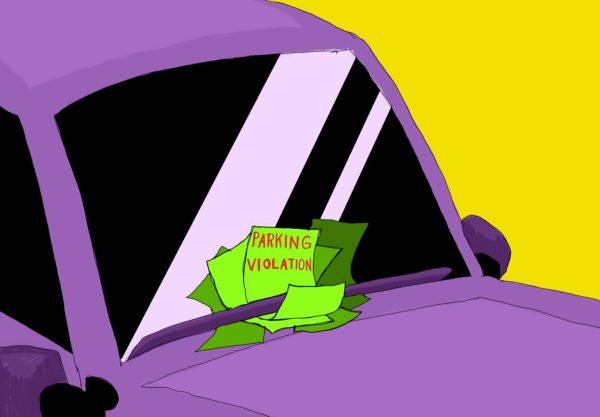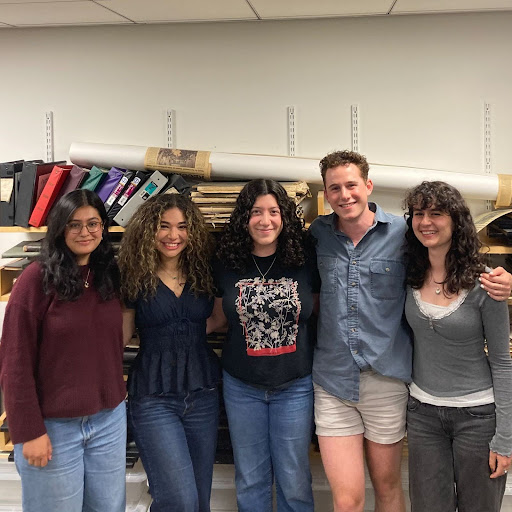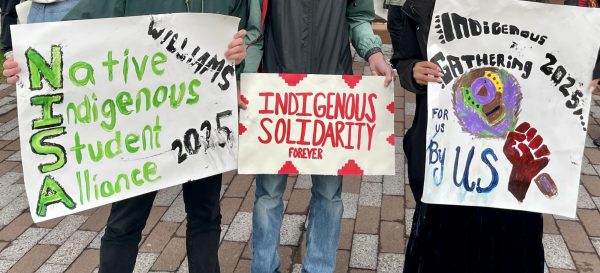Students reflect on the year when COVID changed everything

One year ago this week, students received an email from President Maud S. Mandel that announced the campus closure and the transition to remote learning. That week, students wept, partied, spent time with friends, and said many goodbyes. The Class of 2020 mourned their last semester. Some students went on to continue the semester remotely. Others remained on campus through the spring and summer.
For every student who was on campus that March, however, the year that followed was one of dislocation and disruption. Some students studied remotely in the fall semester or for the whole year, while others returned to a campus shaped by new health and safety restrictions. But the pandemic has affected everyone differently, whether it be academically, physically, or emotionally.
“Last year was really uncertain, and I think that was where a lot of the fear came from,” Hannah Stone ’22 said of the pandemic. “Everybody was kind of scared, like, ‘What’s going to happen? How’s this going to affect my family? My grades? My financial aid?’”
Stone’s fears mirror what many students felt on March 11, one year ago. This week also marks one year since the World Health Organization (WHO) declared the COVID-19 outbreak a pandemic. Since then, so much about our campus and our world has changed.
Reactions to Mandel’s email
Roxanne MacKinnon ’23 opened Mandel’s email while walking from Schow Science Library to Stetson Court in between classes. They said they weren’t surprised about the campus shutdown, since other peer institutions had already closed for the semester.
“I was like, I sort of expected this,” they said. “Part of me was like, ‘Oh cool, we’ll be off for a few weeks, and maybe we’ll come back,’ but I definitely didn’t think it would be going on for a whole year. I was like, ‘This’ll be done in a couple months.’ And so I wasn’t super broken up about it.”
Kennedy Long ’21 was in the middle of class when the campus received Mandel’s email. While the decision was also unsurprising to her, the aftermath of the email was emotional for her classmates as well as her friends. “We all very slowly got up and walked to Paresky, where so many people were, and just started crying,” she said. “I’ve never seen so many emotional individuals in one space.”
Long was originally a member of the class of 2020 before taking a year off after her first year. She decided to stay on campus her junior year and go abroad her senior year so that she could take part in senior activities with her original classmates and friends. Mandel’s email not only meant an end to the in-person school year, but it also meant a premature goodbye to her friends who were seniors at the time.
On the same day, just a few hours earlier, Elizabeth Bigham ’21, who was studying abroad in Denmark, received an email from the program announcing its cancellation. For Bigham and her friends abroad, the decision did not come as a surprise.
“We kind of saw it coming,” Bigham said. “I remember at some point in the semester, my friends and I started taking bets on when we’d get sent home. And we were like, ‘Our days are numbered.’”
Majda Murati ’21 was studying abroad in Germany when she received Mandel’s email about the campus shutdown. Just one day earlier, former President Donald J. Trump had announced the closing of the U.S. border to foreign nationals traveling from Europe, but Murati said that it wasn’t clear whether that meant she and her friends who were abroad could come back.
“At that point, the program was still going to continue in person and also offer remote options to their students,” she said. “But it wasn’t until Williams emailed everyone who was abroad saying, ‘We highly encourage that you go home’ — that was the moment where me and my friend, who was also a Williams student, … booked our flights that Saturday. It was a really quick turnaround.”
As someone who was staying with a host family, Bigham was given 72 hours from the time the announcement was made to pack and leave. She landed at Los Angeles international Airport on March 13, 30 minutes before midnight.
Murati and Bigham were far from the only students whose study abroad plans came to a screeching halt. “Last spring we had 127 students studying away, which is around the average number of students that we send each semester,” Director of International Education and Study Away Tina Stoiciu wrote in an email to the Record. “Almost every student departed their programs due to COVID-related closures and evacuations.”
Final days on campus
In the days between March 11 and March 17, 2020, many students rotated between packing and partying, without wearing masks or socially distancing, since such guidelines had not yet been implemented. Indeed, during those early days of the pandemic, not many on campus even knew what social distancing meant.
“I did not go to it, but there was a huge blowout party on Hoxsey,” Stone said. “Mostly, I was just saying goodbye to friends, just being with people in the last few minutes and then driving people to the Albany airport.”
Stone is a transfer student whose first year at the College was interrupted by the pandemic last March. “I was kind of just hitting my stride in January, February,” Stone said. “I had just started meeting people, and now everybody’s gone.”
In the aftermath of Mandel’s email, Long tried to make the most out of her short goodbyes to her senior friends before they were scheduled to depart campus.
“We pretty much hung out like all day, every day, got meals together, and did other things together,” she said. “I also had never met so many new people in just a short amount of time as well… The little things that we didn’t really have the opportunity to do during the school year just got really condensed into one week, and [we] just had fun.”
Stone stayed on campus after the shutdown and said she befriended some of the other students who remained. “I do think the campus community really did come together for each other for the people that were left,” she said. “We started a group chat, ‘those who remain,’ and we really did come together. People started a drive at the Davis Center for items that people might need … and there was lots of emotional support for whoever needed it.”
Gray Livingston ’20 was devastated at losing his graduation ceremony and his last months at the College. “I had pretty high aspirations [as] a senior. I played frisbee, and I felt very strong about how good our frisbee team was,” Livingston said. “I was super excited for the senior week activities… The month of graduation was just going to be a month of a party.”
But for Livingston, who was a first-generation student, graduation also had a deeper meaning. “It felt like a really big deal … being the first kid to go to college … for a family of fishermen and farmers for generations,” Livingston said.
“It really could have been a lifetime highlight. Like 50 people bought plane tickets and hotel rooms to come to the graduation,” Livingston said. “It felt like a deeply personal loss.”
As those who remained settled in on a mostly empty campus, the College transitioned to remote learning for the first time. Both faculty and students experienced challenges.
“As a community college transfer who’s taken online classes, it was especially frustrating because all of my professors at the community college knew how to use our platforms and were trained in it,” Stone said. “It didn’t seem like [Williams] was really giving our professors support in that.”
To make matters worse, Stone contracted COVID-19 right as classes went online last spring. “I didn’t know what it was, at that point in time,” she said. She also noted the difficulty she experienced staying engaged through the end of that semester. “It was really difficult to focus,” she said. “It was kind of difficult to care.”
Remaining on campus after shutdown
Katya Khalizeva ’21 and Mae Erzini Vernoit ’21, two international students, were approved to stay on campus after most students had left. Khalizeva, who is from Moscow, Russia, said her request to stay was approved because Russian students studying in the United States get a visa for only one year at a time.
“Even though I can legally continue staying here, if I leave [the United States] with an expired visa, I will have to get a new one in order to come back,” Khalizeva said. “And my visa expired in early June.”
Erzini Vernoit initially planned to return to her hometown of Tangiers, Morocco, after the College shut down. She was studying away at Columbia University during the spring semester, and returned to the College to collect her belongings. But by the time she got to the College, Morocco had announced a three-month border closure.
“I was stuck here,” Erzini Vernoit said. After the border restrictions were lifted in midsummer, she chose to continue living on campus. “I was waiting for Maud’s announcement [regarding the 2020-21 academic year],” she said.
Khalizeva credited the International Students Association (ISA) for advocating for students during the period following Mandel’s email. “Pretty much 24 hours a day, they were … trying to plan, collect resources, and keep track of everyone whose petitions to stay were getting rejected and [helping] them figure out what to do,” Khalizeva said. “The general goal was to support not only internationals but also other people who [were] staying on campus.”
After the dust had settled, the College’s support of those who remained had its positives and negatives, according to Khalizeva. “There were some great things [the College] did, such as free housing, free food, and just letting us stay to begin with,” she said.
However, Khalizeva said there was a lack of transparency from the College about its decision-making. “We were switched around between dorms a lot, the rules would change, and we weren’t sure whether they were being enforced or not,” she said.
Khalizeva also remembered the discrepancy between her monotonous routine on campus during the summer and the tumultuous events occurring worldwide. “Your daily life [looked] the exact same as it did a day ago, a week ago, a month ago,” Khalizeva said. “But then following the news, and — just a complete mess.”
As national cases climbed and the economic downturn worsened, the inequitable impact of the pandemic also became increasingly clear. Within the College community, students who faced financial insecurity, had high-risk family members, or contracted COVID themselves were among those who faced the pandemic’s effects most viscerally.
Changes to campus life
Once many students returned to campus in the fall, the life that awaited them was different from the one they had left behind in March. The school has changed in many ways in compliance with COVID-19 guidelines to prevent or contain a potential outbreak. Prominent changes include living in pods, being tested twice weekly for COVID, taking most courses remotely, not being able to eat in the dining halls, and restrictions on gatherings and group activities. But many students said the biggest change of all has been the increased difficulty of maintaining their social lives.
MacKinnon said that it’s been difficult to interact casually with other students. “I think on a day-to-day basis, the most significant difference is just not being able to see the people who I sort of know and have very casual conversations,” they said. “The fact that you can’t really do that as much makes it feel like you’re sort of isolated from the campus community.”
As a senior on the cross country team, Bigham said that it was shocking to lose her last season, especially considering that she had walked on as a sophomore.
“The season[s] I had sophomore and junior year weren’t super successful,” she said. “I get injured pretty easily, and I was really hoping to kind of have a redemption season through meets.”
However, Bigham said that shifting the focus away from competitions allowed for a lot of personal improvement.
“I remember just deciding to run as fast as I could for as long as I could into the school year with my friends and just exploring Williamstown,” she said. “And in that sense, I’ve had my best season ever because I didn’t get injured. I think because we weren’t competing, it was just about being with each other and running with each other.”
Despite restrictions on student gatherings and activities, Long said that she has unexpectedly been able to do activities with her pod that somewhat resemble the collegiate social experience.
“Specifically in the fall, we did a lot of fun activities like going to Stone Hill and being outside,” she said. “[It’s like] the quintessential college experience, almost. You hang out with these people, you’re always in their rooms, you’re always out and about… It’s been really nice to have people around.”
For first-years, the pandemic has defined the only college life they have ever experienced. “It‘s funny because I feel like a lot of upperclassmen have a lot of complaints about what campus life is like these days,” James Burge ’24 said. “But for me, this is sort of all I’ve known.”
“I have loved it so far,” Burge continued. “It is hard to meet people, but it’s better than not meeting anybody, which is what I did for months before coming to college.”
Like Burge, many members of the Class of 2024 also had the misfortune of grappling with the effects of the pandemic as both college first-years and high school seniors. “There was always that hope that maybe we’d be allowed back in June, or maybe we’d have a graduation ceremony, or maybe I’d be able to see my friends eventually,” Burge said. “But it was pretty tough.”
Mental health in a pandemic
Across the nation, the pandemic has had debilitating effects on mental health, particularly among young people. For college students, the isolation and the feeling of loss that come with not being able to see their friends can feel especially intense. In a Record survey sent to 400 random unixes, nearly two thirds of respondents said that COVID-19 has had a negative impact on their mental health.
Bigham said that the first lockdown after school switched to remote was especially difficult due to being unable to see her friends on the East Coast and focus on her remote courses.
“My remote coursework for that first spring was just no good,” she said. “I wasn’t engaged. I wasn’t learning anything. And not having structure or any semblance of real life, my mental health took a major major dive.”
Long echoed a general sense of exhaustion during that time as well. “Just texting or responding to someone felt like such a task. So it was really hard. I lost motivation to even do simple things. Everything just took a toll,” she said.
Long also emphasized the stress that came with constant exposure to anti-Black violence on media outlets and performative activism on social media during the summer’s national reckoning over racial injustice. “It was kind of like I was fighting two pandemics: COVID and racism,” she said.
Despite mental health challenges, the summer was also a time for Long to reflect. “I learned how to relax and find other things to do and not have that mindset of ‘I have to be working,’” she said. “[I just] reprioritized what mattered to me.”
Reflections on a year of change
As March 11, 2021, draws near, some students have been contemplating how they will mark the significance of that date.
“There are some things to celebrate,” Burge said. “Not me, but the rest of my family members have been vaccinated.”
Looking back on the past year, Long reflected on the importance of not taking people for granted.
“Take advantage of the moments in time that you are with friends and family and to also make time for the people you love,” she said. “Because honestly, [during] those last few days on campus, I realized I did not make enough time for my friends… I tell myself looking back now, ‘Make sure you prioritize the people in your life. You can always go back to work. You can always go back to your studies. But you won’t necessarily always have those people by your side.’”
Annie Lu ’23 is a political science and mathematics major from San Diego, Calif. She is a senior writer. She previously served as the editor-in-chief...
Bellamy Richardson ’23 is an English major and Jewish studies concentrator from New York, N.Y. She is now a senior writer and served as a managing editor...
Saud Afzal Shafi ’22 is a computer science and English major from Lahore, Pakistan. He is a senior writer. He previously served as section editor (2020)...
Alice Qu ’22 is a biology and economics major from New York, N.Y. She is a senior writer. She previously served as the executive editor for sports, executive...







